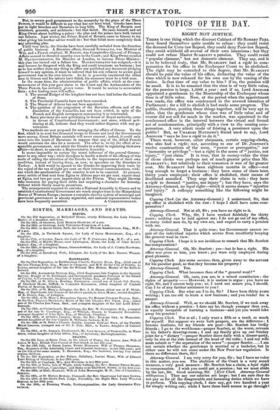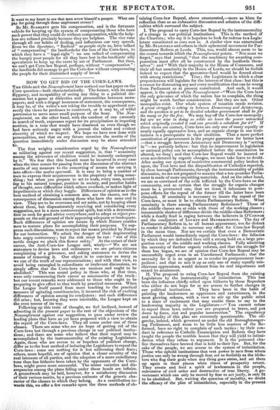TOPICS OF THE DAY.
RIGHT NOT JUSTICE.
Timm is one thing which the discreet Cabinet of Sir ROBERT PEEL have found themselves quite unable to refuse : they could resist the demand for Corn-law Repeal, they could deny Poor-law Repeal, they could withhold all avowal of their own intentions ; but they could not refuse Master ScsaLETT a pension. They could resist " popular clamour," but not domestic clamour. They say, and it is to be believed truly, that Mr. ScAuLurr had a right to com- pensation for his office in the Exchequer Court to be abolished. The right may be conceded to this degree, that Mr. SCARLETT should be paid the value of his office, deducting the value of the time which is now released for his own use by the ceasing of the duties. Is that time of any value to him ? if so, the pension will be small. It is to be assumed that the time is of very little value, for the pension is large, 1,500/. a year : and if so, Lord &BINGER appointed a gentleman to the Mastership of the Exchequer whose time is of little value. Now, at the period when the appointment was made, the office was condemned in the avowed intention of Parliament ; for a bill to abolish it had made some progress. The public, therefore, putting these things together, will be very apt to infer, that the gentleman whose time was of little value and of course did not sell for much in the market, was appointed to the condemned office in the interval between the virtual and formal act of condemnation principally with a view to the coming com- pensation. A very adroit mode of foisting a pensioner upon the public! But, as CHARLES MATHEWS'S friend used to say, Lord ABINGER "says he has a right to do it." There were, however, other claimants, certain copying-clerks, who also had a right; not, according to one of Dr. JOHNSON'S twelve constructions of the term, "power or prerogative," nor "immunity or privilege"—but a right in the sense of " justice, not injury," "just claim." It is true, that in money-value the time of those clerks was perhaps not of much greater price than Mr. SCARLETT'S • but relatively to their resources it was of far greater cost. Mr. ScARLsurr had been eighteen months in office—not long enough to forget a business : they have some of them been thirty years employed ; their office is abolished, their means of livelihood annulled. They urge their claim in vain : they have a right to demand "justice, not injury"; but they have, says the Attorney-General, no legal right—which it seems means "injustice and injury." A colloquy something like the following might be imagined.
Copying Clerk (to the Attorney-General.) I understand, Sir, that my office is abolished with the rest : I hope I shall have some com- pensation?
Attorney-General. Not at all, Sir; you have no right to it.
Copying Clerk. Why, Sir, I have worked faithfully for thirty years ; nothing can be said against me; I do not go out of my office, as many richer men do, by my own act, and expect to carry a pension with me.
Attorney-General. That is quite true; but Government cannot re- pair all the individual injuries which accrue from steadfastly keeping the general weal in view.
Copying Clerk. I hope it is not invidious to remark that Mr. Scarlett has compensation?
Attorney-General. Oh, Mr. Soarlett : yes—but he has a right. His office was given to him, you know ; you were only employed daring good pleasure.
Copying Clerk. Are some services, then given away to the servant for his peculiar good, so that they become his property ?
Attorney- Genera Yes.
Copying Clerk. What becomes then of the " general weal?"
Attorney-General. Oh, ours, you see, is a mixed constitution : the rights of property — However, it is useless to argue : you have no right, Sir, and I cannot help you; or, I need not assure you, I should. Can I be of any further assistance to you?
Copying Clerk. But what am Ito do, Sir? I have been thirty years writing; I am too old to learn a new business ; and you render me a pauper.
Attorney-General. Well, so we should Mr. Scarlett, if we took away his office without a pension : I dare say he, though younger than you, is equally incapable of learning a business—and yet you would take away his pension Copying Clerk. Not at all ; I only want a fifth or a tenth as much for myself. But suppose we were both paupers, see the difference I become destitute, for my friends are poor—Mr. Scarlett has lordly friends ; I go to the workhouse—pauper Scarlett, at the worst, retreats to his father's drawing-room ; I and my family give up our Sunday joint for a "dietary "—pauper Scarlett dines daily with a dinner-party, only he sits at the side instead of the head of the table ; I and my wife
mast submit to " the separation of the sexes "—pauper Scarlet I am not certain whether the gentleman is married or a bachelor, but in either case be will not come under the New Poor-law regulation. Is there no difference there, Sir?
Attorney-General. I am very sorry for you, Sir ; but I have no voice in this matter, you see. The abolition of the Court is a very sound measure, a very good measure : Mr. Scarlett has a claim, a legal right to compensation. I wish you could get a pension ; but we must abide by the law, Sir. Good morning, Sir. [Exit Clerk. Attorney-General soliloquizes.] They say our salaries are large; but I am sure they do not pay us for all the disagreeable and harassing duties which we have to perform. This copying-clerk, I dare say, got two hundred a year for simply writing out; while I have these hard scenes to go through!
It went to my heart to see that man avow himself a pauper. What can pay for going through these unpleasant scenes ?
So Mr. SCARLETT gets his compensation, and is the fortunate vehicle for keeping up the system of compensating those who have such power that they could do without compensation, while the help- less are refused precisely because they are helpless. The vice runs through all our habits of dealing, and influences our very speech. Even we the Spectator, "Radical" as people style us, have talked of " compensating" the landlords for the loss of the Corn-laws, to which they have a "legal right ": no one talked of compensating the hungry poor people for all they have lost in the landlords' silly peculation to keep up the rents by act of Parliament. But then, we can't get Corn-law Repeal, perhaps, without " compensation " : the landlords did manage to get the Corn-law without compensating the people for their diminished supply of bread.



























 Previous page
Previous page